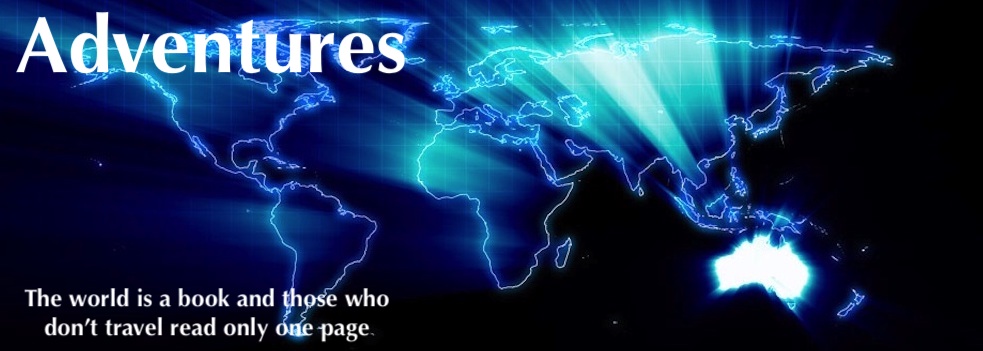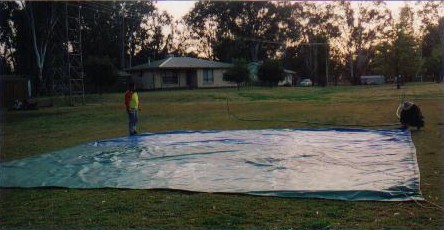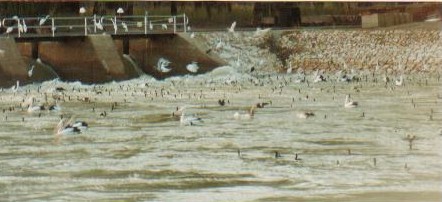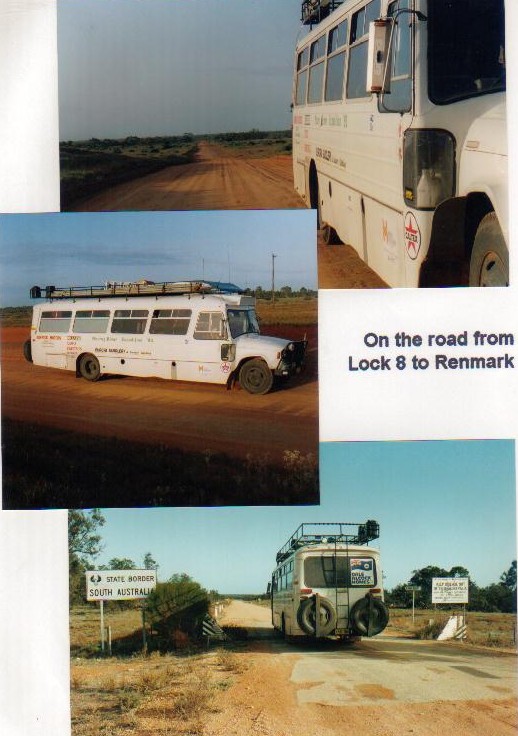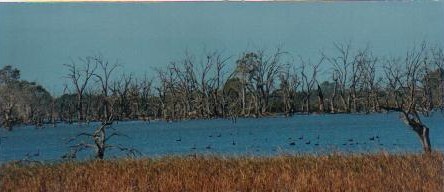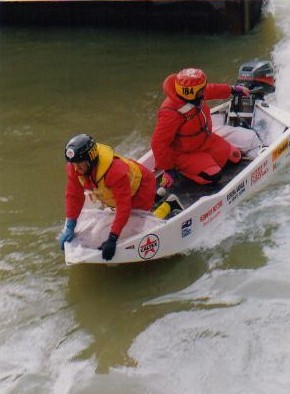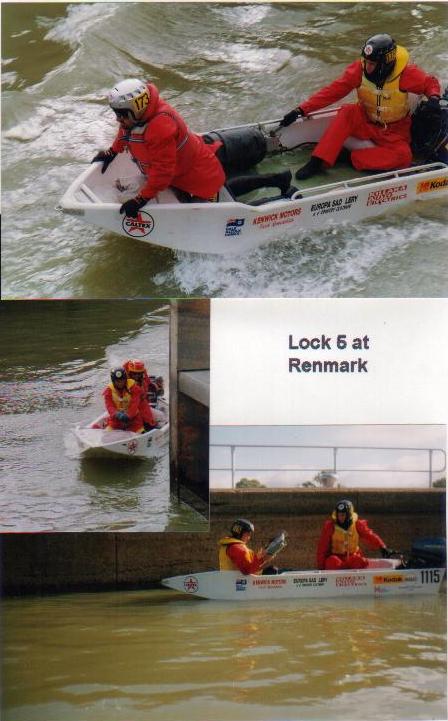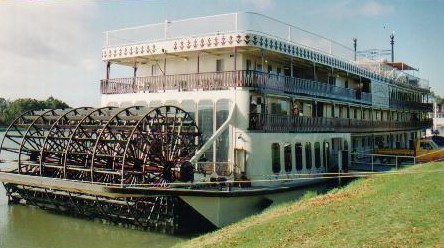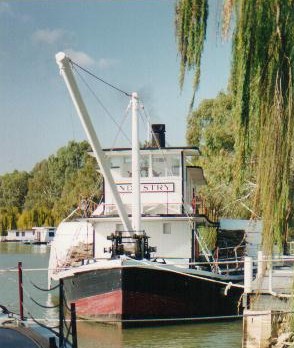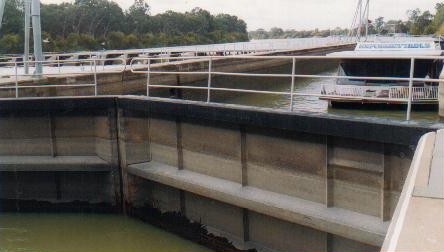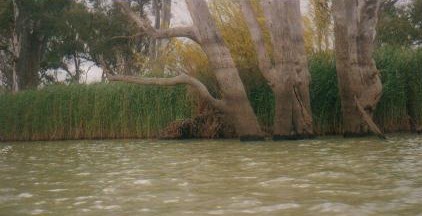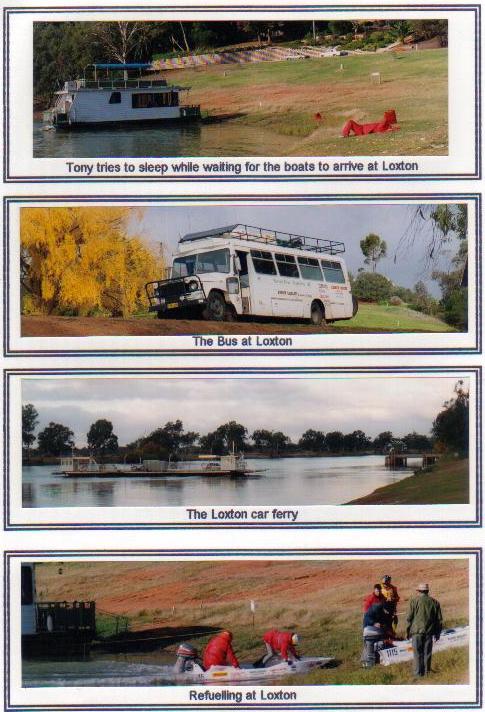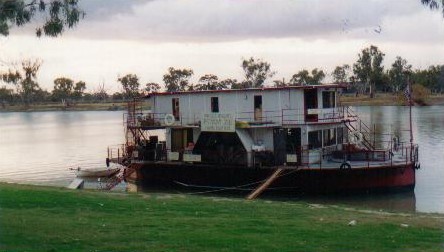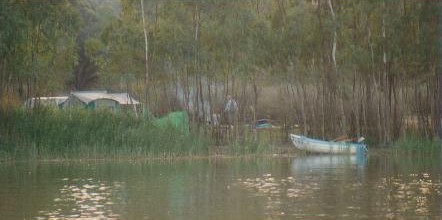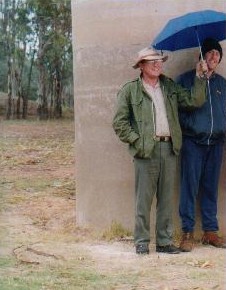A bleak morning greeted us after a night of wet and windy weather. Peter, Geoff, Kevin and Stewart took off early in the boats.
From Wentworth the support crew had been on the northern bank. It was time to return to the southern bank. This meant that Tony and I had a long drive down to Renmark and then back upriver on the southern side to refuel the boats.
The record attempt on the water started at first light. Not long after we refuellers started our long haul. The Bus crew were left to strike camp and pack equipment.
- Packing up.
- Good fishing.
- The Bus on the road to Renmark.
- Lake Victoria
Tony and I ran out of fuel three kilometres short of Renmark and had to use our ’emergency’ supply. We passed through Renmark and headed upriver to the pre-arranged refuelling point.
We arrived in the general area and were uneasy about proceeding too far upriver in case the boat crews passed us. This meant a few quick calculations to ascertain the optimum position to wait – calculations that were checked and re-checked the longer we waited for the boats.
The weather was fine but the wind was bitingly cold and blowing into the face of the boat crews. After what seemed like an eternity but in reality was only two hours, they arrived at the checkpoint, cold (except for Kevin who was surprisingly not affected by the bitter conditions) and ready for a crew change that was not to be.
Disappointed to be told that it was only a refuelling, they were sent on their way with the promise of reaching Renmark within the hour (I lied but tried not to show it when talking to the boat crews). They would take one hour twenty minutes to reach Renmark.
Tony and I in the Triton rvd with The Bus crew at the Renmark Lock. Greg, Michael, Rin and Adrian were suited up ready to take over from the frozen first crew.
- Leaving Renmark Lock.
- Lock 5 at Renmark.
- Murray Princess at Renmark.
- PS Industry
- Lock
- The height of the previous floods can be seen on the trees.
The expedition was settling in to a routine and the kilometres were being eaten up. There was plenty of water in the river and the weather was friendly. It was relatively easy going. Both land crews headed to Loxton and refuelled the boats in the early afternoon, in between light showers. From Loxton it was a case of escorting the boats through the Riverina – farms, orchards, wineries and small towns.
- At Loxton.
- Madam Jade
- Riverside camp
The selection of the overnight stop was subject to continuous change as I gauged the progress of the boat crews. Initial planning indicated Waikerie, and possibly even Morgan as the overnight stop. Eventually I decided that the boat crews could reach Waikerie and The Bus crew were sent ahead to set up camp.
Tony and I found a boat ramp at Kingston on Murray that was a suitable refuelling point. The boat crews arrived later than expected and Waikerie was starting to look doubtful. However, I decided that there was no option but to push on. Twenty nine kilometres short of Waikerie, we waited for the boats at a pumping station near Fleurieu Station. Waikerie as a target was becoming increasingly remote. After discussion, Tony and I decided that the only way to step up the pace was to remove the slowest boat from the water. When the pair of boats finally arrived at the pumping station near last light at 1750, Rin and Adrian were taken off the water. They experienced what Kevin and Stewart had experienced earlier – a ride in the back of the Triton.
A promised 15 km ride into Waikerie proved correct but we spent another ten minutes trying to locate the camp – much to Adrian’s inexplicable chagrin.
Bernie had earlier experienced much difficulty in trying to book into the only caravan park in town. He explained to me, via radio, that “the stupid bitch can’t make a decision. We have no showers, no fires, and no power”. Fortunately, her husband arrived back and organised a spot very close to the river, stoked up the boiler and connected the power. Survival was assured – although the expedition was set up to be completely self sufficient.
- Kim and Kevin seek shelter from the rain.
After what seemed a very fast run because of the narrowness of the river, the flat water and the gloomy half light, Greg and Michael arrived about 1817. At an average speed of 64 kph, it was as fast as any boat had gone during the expedition.
After discussion around the campfire that night it was decided to run only one boat to Wellington, from where a second boat would be put in the water for the trip across Lake Alexandrina.
Lessons learnt on Day Six:
- Where possible overnight stops should be planned ahead.
- Time and distance calculations don’t lie; people’s perception of speed can be flawed.
